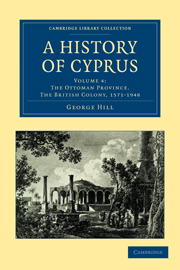Book contents
- Frontmatter
- Contents
- List of Plates
- Preface
- Editor's Foreword
- Documents and Publications Referred to
- PART I THE OTTOMAN PROVINCE
- Chapter I The Ottoman Organization
- Chapter II Western Relations in the Seventeenth Century
- Chapter III Kapudan Pasha and Grand Vezir (1571–1785)
- Chapter IV Ascendancy of Dragoman and Bishops (1785–1821)
- Chapter V Abortive Reforms (1821–1856)
- Chapter VI Last Days of Turkish Rule (1856–1878)
- Chapter VII The British Occupation (1878)
- Chapter VIII The Church under the Turks (1571–1878)
- PART II CYPRUS UNDER BRITISH RULE
- Appendix I Orthodox Archbishops of Cyprus, 1571–1950
- Appendix II British High Commissioners and Governors
- Index
- Map
- Plate section
Chapter III - Kapudan Pasha and Grand Vezir (1571–1785)
Published online by Cambridge University Press: 13 June 2011
- Frontmatter
- Contents
- List of Plates
- Preface
- Editor's Foreword
- Documents and Publications Referred to
- PART I THE OTTOMAN PROVINCE
- Chapter I The Ottoman Organization
- Chapter II Western Relations in the Seventeenth Century
- Chapter III Kapudan Pasha and Grand Vezir (1571–1785)
- Chapter IV Ascendancy of Dragoman and Bishops (1785–1821)
- Chapter V Abortive Reforms (1821–1856)
- Chapter VI Last Days of Turkish Rule (1856–1878)
- Chapter VII The British Occupation (1878)
- Chapter VIII The Church under the Turks (1571–1878)
- PART II CYPRUS UNDER BRITISH RULE
- Appendix I Orthodox Archbishops of Cyprus, 1571–1950
- Appendix II British High Commissioners and Governors
- Index
- Map
- Plate section
Summary
Apart from ecclesiastical affairs, and the relations of the island with the western Powers, the history of Cyprus for about a century after the Turkish conquest is little but a record of plague, locusts, drought, famine and earthquakes. These visitations repeat themselves with a sad monotony, and not more than a few need our attention here. One of the worst attacks by locusts culminated in 1628, after the insects had paid visits to the island regularly for eighteen years. Matthew Kigala was sent to Mount Athos to beg for the loan of the head of St Michael of Synnada, which was thought to be effective against both locusts and plague. But although they were assured that the Turks themselves guaranteed the safety of the relic and had issued orders to that end, and the Patriarch Cyril Lucaris also gave his personal pledge, the monks refused to let the precious object out of their hands.
Another demand for it in 1692 met with the same response. When Archbishop Philotheos tried again in 1740, he was told that if he would come to fetch it himself, it would be entrusted to him. Circumstances prevented him from making the journey. He renewed his effort in November 1757, but with what result is not known; nor do we hear that Ephraim, whom Archbishop Paisios sent on the same errand in 1759–60, was successful. In the time of Archbishop Kyprianos (1810–21), the belief was current that locusts were immortal, and the more one killed of them, the more rose again.
- Type
- Chapter
- Information
- A History of Cyprus , pp. 67 - 99Publisher: Cambridge University PressPrint publication year: 2010First published in: 1952



